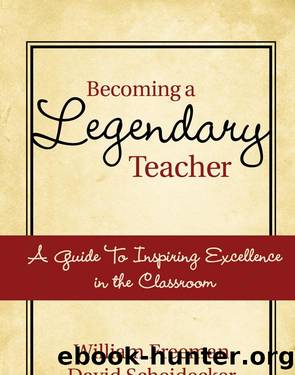Becoming a Legendary Teacher by William Freeman

Author:William Freeman
Language: eng
Format: epub
ISBN: 9781616085865
Publisher: Skyhorse Publishing
FocusâFocusâFocus
* * *
Regardless of whether the teacher operates in a traditional or a block schedule, academic planning begins with the vision described in Chapter 3. Where will the students be if everything goes as planned by the end of instruction? What will the student be able to do or know? Because this text is primarily designed as an aid to the individual teacher as he or she strives to become a classroom legend, we will forgo a discussion of curriculum development. Needless to say, if an incoming teacher is handed an established curriculum with course syllabi and pacing charts, planning is much easier and probably much more efficient. When that is not the case, then the individual teacher must follow the guidelines presented here.
STEP 1: Focus on learning. One of the big pitfalls of many teachers is that they focus on teaching, when in fact, they should focus on learning. The focal point of the classroom experience ought not to be what the teacher does, but what the student will be able to do following successful learning. This requires identifying core skills, essential questions, and mandatory knowledge. Call it what you will; the legend knows exactly the point of instruction.
STEP 2: Focus on pacing. The next step is to make a course syllabus that outlines the major concepts and objectives that will be covered in the class. The concepts and objectives are almost always divided into topical units, although the organization of the skills to be mastered is up to the individual teacher. Every teacher, no matter how good, who fails to focus on pacing, will wander and end the year just short of time. Put it this way: if the first-grade teacher falls three weeks behind, and the second-grade teacher does the same, and so forth throughout a childâs education, then the child loses an entire year of schooling. Experience suggests that building in review days and testing days is mandatory. In fact, the wise teacher often builds in a few extra days with each unit of study. In education, one can always count on the unexpected: assemblies, achievement testing, remediation, and so forth. These âextra daysâ are never free days, and if they are not needed for anything, they may be used as enrichment daysâbut they too are task oriented.
STEP 3: Focus on pedagogy. Once the teacher has determined the course goals and pacing chart, the next step is to begin construction of actual lesson plans, plans that keep the students interested (not bored), make students active learners (not passive learners), and keep students meaningfully on task (not just busy). As a teacher begins to fashion a lesson, he or she would be wise to keep the following direction in mind: if students are engaged in significant learning activities, they should be able to answer any of these questions at any point in the unit:
< What am I doing?
< Why am I doing it?
< When will I be done doing this?
< How will I know if I have succeeded?
Presentation of all material should be done in light of these four concerns.
Download
This site does not store any files on its server. We only index and link to content provided by other sites. Please contact the content providers to delete copyright contents if any and email us, we'll remove relevant links or contents immediately.
Deep learning with TensorFlow and Keras by Derrick mwiti(902)
Understanding PDA Autism in Kids: A Guide for Parents and Teachers to Support Neurodiverse Learners by Jehu Len(836)
The Victorian Era: A Captivating Guide to the Life of Queen Victoria and an Era in the History of the United Kingdom Known for Its Hierarchy-Based Social Order by Captivating History(612)
Writing Solid Code: Development Philosophies for Writing Bug-Free Programs by Steve Maguire(532)
100 Ideas for Secondary Teachers: Engaging Parents by Janet Goodall & Kathryn Weston(511)
Intersectionality in Educational Research by Dannielle Joy Davis; James L. Olive; Rachelle J. Brunn-Bevel; Susan R. Jones(506)
How to be assertive in any situation by Hadfield Sue & Hasson Gill(500)
Brain Teasers to Build Critical Thinking Skills: Brain Exercises for Tech, Banking, Case Interview Prep, and to Keep Your Mind Sharp by Kris Safarova(487)
Brain Teasers to Build Critical Thinking Skills by Safarova Kris(483)
Python 101 - Fundamentals by Sam(452)
Critical Curriculum Leadership : A Framework for Progressive Education by Rose M. Ylimaki(444)
The Art of Emotional Validation: Improve Your Communication Skills and Transform Your Relationships by Validating Emotions and Feelings by Emily Wright(414)
A Beginner's Guide to SSD Firmware by Unknown(401)
The Knights Templar: An Enthralling History of the Rise and Fall of the Most Influential Catholic Military Order by Wellman Billy(400)
NumPy : From Basic to Advance by bisht Karan Singh(398)
Alma Maters (5th edition) by Unknown(389)
The Future Knowledge Compendium by Ellyard Peter;(388)
What Every Teacher Should Know about Learning, Memory, and the Brain by Tileston Donna E. Walker;(386)
Make wealth from intraday trading by Maddy MADDY(375)
